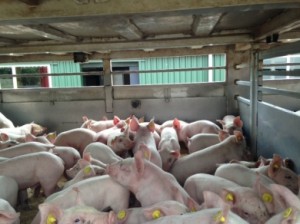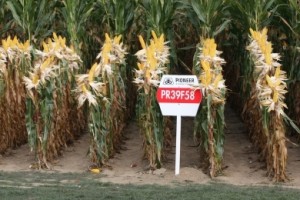2014 – 6 وُولدْلُوگْالأسبوع
وأخيرا ترجع مراقبة نقل الحيوانات مرة أخرى ليد السلطة. في سنة 2011 قمت بحركة في هذا الموضوع. حيث تمت مساندته من طرف الاغلبية، لكن وجب علينا الانتظار حتى عام 2014 حيث أدركت كاتبة الدولة للشؤون الاقتصادية أنه لا يمكن ان يبقى هذا على حاله. كاتبة الدولة للشؤون الاقتصادية دايكسما قالت أخيرا في الاسبوع الماضي انها لم تعد تعترف بإشراف ونهج المراقبة لفرع نقل الحيوانات. وستأخذ مرة أخرى المسؤولية في يدها.
سنويا تعبر الملايين من الحيوانات الحدود في شاحنات. وسال النقل مقترنة تكرارا بمعانات الحيوانات. تبقى الحيوانات غالبا أكثر من ثماني ساعات في شاحنات مكتظة بدون أكل أو شرب. القوانين لحماية الحيوانات أصبحت تتبع بطريقة سيئة. وقد تم في السنوات الاخيرة تقشف كبير فيما يخص إشراف السلطات. التنظيم الذاتي داخل فرع نقل الحيوانات أظهر بأنه ليس بالفعال. الغرفة كانت جد واضحة: السلطة يجب ان تقوم بما يجب عليها القيام به. خاصة فيما يتعلق المعايير، المراقبة والتطبيق. إذ مراقبة السرعة لا تترك في أيدي السائقين. نحن سعداء أن الاشراف أخيرا يعود مرة أخرى للحكومة. وسنواصل العمل من أجل الحد من سحب الحيوانات.
زميلتي استيير اوهاند Esther Ouwehand عززت نفسها الاسبوع الماضي ضد إدخال الزراعة الجينية الجديدة في الاتحاد الاوروبي. اللجنة الاوروبية اوشكت بإعطاء ترخيص لزراعة الذرة المعدلة وراثيا نوع 1507. إذا ما حدث ذلك. تصبح كل دول الاتحاد الاوروبي ملزمة بزراعة هذا المحصول المثير للجدل في حقولها.
الدول التي لا تريد ان تمشي مخاطر التعديل الوراثي كالنمسا وفرنسا، أبدت معارضتها منذ وقت طويل. هولاندا لم تقم ابدا بتحديد موقفها. والذي قد يكون قبول لهذه الزراعة في جميع الاتحاد الاوروبي. لقد قمنا بدعوة حكومتنا من أجل إعطاء الاولوية لحرية الاختيار للمواطنين، الفلاحين والدول الاعضاء. والتصويت ضد قبول الزراعة الجديدة المعدلة وراثيا.
نرفض بحزم الهندسة الوراثية. ونجد على كل حال ان الدول لا يجب ان تجبر على زراعة الزراعة المعدلة وراثيا على اراضيها. الذرة المثيرة للجدل لبيونير (Pioneer)هي نباتات معدلة وراثيا و التي تبعث مادة سامة باستمرار. هذا السم الذي تنتجه النبتة يهدف للقضاء على حفار الذرة، لكن هذا يجلب أيضا أضرارا للفراشات والعث. علاوة على ذلك فان النباتات صمتت مقاومة للمبيدات التي تحتوي على الغلو فوسنان. في حين يحذر العلماء بأن هذه المقاومة تجعل المزروعات تستلزم استعمال عالي للمبيدات. تقف بروكسل عند نقطة السماح للزراعة المعدلة وراثيا التي تقاوم مواد مع أخطار جد كبيرة للثدييات والكائنات الاخرى. بسبب مخاطر العلو فوسنات فقط تم رصد محاولة لتفسير استعمال مضاد الاعشاب الضارة هذا. نتمنى ان ترى حكومتنا أيضا مخاطر السماح بالزراعة المعدلة وراثيا للذرة وتمنعهم من ذلك.
محزن ومحبط ان نقرأ كيف ستسير الامور مع بلغاريا ورومانيا. اقرأ هنا في مدونة مجلة الاقتصادي the Economist حول الوضع في هذا البلدين.
هذا الاسبوع أيضا صورة من @!Fascinatingpics: Freefall
الى الاسبوع المقبل! ماريان
The control of animal transportation will at last go back into the hands of the government. In 2011, I already laid down a motion on this, which was then also supported by the majority, yet we had to wait until 2014 before the State Secretary finally realised that animal transportation couldn’t go on like this. State Secretary Dijksma of Economic Affairs finally informed us last week that she no longer acknowledges the supervision and control system of the animal transportation industry and that she is taking responsibility into her own hands again.
Each year, millions of animals are transported across the borders. Those transportations regularly involve animal suffering. Animals often have to stand in overcrowded lorries for more than eight hours without any food or water. Animal protection regulations are seriously violated and drastic cuts were imposed on government control over the past years. Self-regulation within the animal transportation industry is obviously not working. The Lower House was clear: The government must do what it is there to do, namely to set standards, and to control and maintain them. You would not opt for car drivers to perform their own speed checks either. We are glad that the supervision is given back to the government and we will continue to do our best to stop them mucking about with animals.
Last week, my colleague Esther Ouwehand made out a case against the introduction of a new GM crop in the EU. It is feared that the European Commission will permit the growing of the genetically modified maize line 1507 of Pioneer. If that happens, all European Member States will have to allow the growing of the controversial crop on their lands.
Countries that do not want to run risks with genetically engineered foods like Austria and France have been objecting for a long time. The Netherlands has still not made clear its position on this, while this can be the determining factor in reaching a decision on permitting this crop in the entire EU. We have therefore urged our government to put the choice of civilians, agriculturists and Member States first and foremost, and to vote against permitting such new GM crops.
We resolutely reject genetic modification and feel that no country should be forced to have GM crops grow on their lands. The controversial maize of Pioneer is a genetically modified plant, which releases a poisonous substance. The poison produced by the plant itself is intended to eliminate the corn borer, but is harmful to butterflies and moths at the same time. Additionally, the plant has been made resistant to pesticides containing gluphosinate. While scientists warn that the use of pesticides will increase when crops are made resistant, Brussels is on the verge of accepting a GM crop that is resistant against a pesticide that has great risks for mammals and other organisms. Because of the dangers of gluphosinate, it is tried to restrain the use of this pesticide. Hopefully our government will also see the dangers of allowing genetically modified maize and stop it!
It is depressing to read how Bulgaria and Romania are doing. Read here the blog in the Economist about the situation in those two countries.
And this week again a picture of @Fascinatingpics: Freefall!
Until next week!
Marianne

